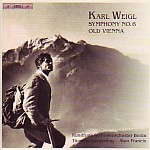If you liked Karl Weigl’s Fifth, then you’ll certainly enjoy his Sixth, though it strikes me as a marginally less interesting work overall. The music positively reeks of that fin-de-siècle ambiance familiar from composers such as Mahler, Zemlinsky, Schreker, and Korngold, and if that’s your cup of tea then you don’t need to read any further. Just buy it. The best movement, as in the previous symphony, undoubtedly is the adagio, a true essay in “adagio style” as the late Romantic German school understood it. The finale also represents a natural and successful culmination to the four-movement cycle. On the other hand, the first movement takes some time to get going, and the scherzo lacks a certain bite–but this impression may change with repeated listening (and the music certainly repays that).
Old Vienna, on the other hand, is a hefty (20-minute) chunk of nostalgic waltz music that does exactly what the title implies. It’s quite wonderful–part ebullience, part decadence, scored with great sophistication, unlike anything else of its type. In both cases conductors Thomas Sanderling and Alun Francis, along with the Berlin Radio Symphony Orchestra, turn in excellent performances of music that sounds atrociously difficult to play well. The strings in particular do some yeoman work, and sonically this is typically well-engineered, if perhaps not quite at the state-of-the-art level we’ve heard on some other recent BIS releases (such as the Grieg music for string orchestra SACD). Still, I can recommend this very worthy release without any hesitation at all–a fine tribute to a serious and interesting composer.
































